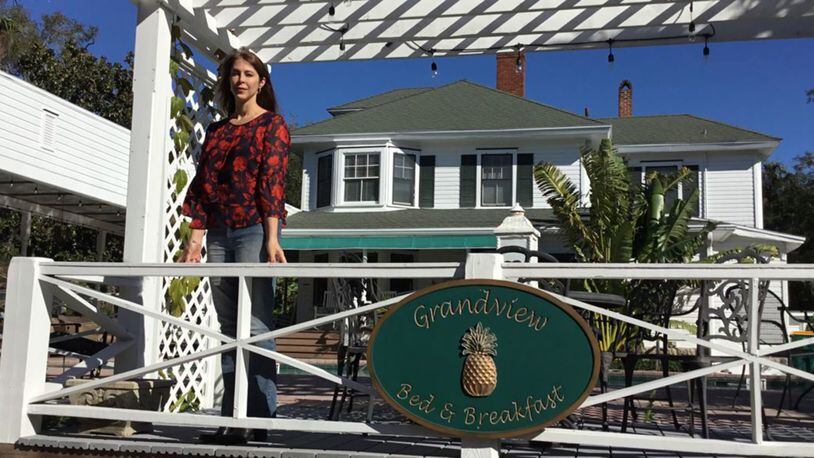“Bed-and-breakfast owners like us are struggling,” she said, frustrated that other hosts aren’t forced to operate under the same rules as B&Bs.
Most don’t face the same fire and safety inspections or pay the same business taxes and fees or adhere to the same lodging rules.
Like Orlando, Orange County and other Central Florida communities who depend on tourists, Mount Dora is struggling to regulate swelling numbers of short-term vacation rentals.
It’s a burgeoning problem.
Airbnb counted 2.7 million guests in Florida in 2017, a 75 percent increase over last year’s guest pool, according to figures the home-sharing company released last week. Nearly 40,000 Floridians shared their homes through Airbnb, earning a combined $450 million in 2017. Hosts typically make about $6,700 a year, the company said.
In Central Florida, Osceola County hosts welcomed 358,400 guests, earning $39.6 million in 2017, according to Airbnb. Those in Orange County shared their homes with 229,500 visitors, making $25 million. Lake County hosts took in 28,500 guests and earned $3.7 million while those in Seminole welcomed 10,400 guests and earned $1.3 million in host income.
Short-term rentals of fewer than 30 days are banned in most residential areas in Orlando and unincorporated Orange County, but hundreds of Orlando-area listings on Airbnb and other home-sharing sites generally are ignored unless code enforcement gets a complaint, often from an unhappy neighbor.
“Statewide data indicates that the vacation rental community is complementing — rather than competing with — the Florida hotel industry,” Airbnb said in its release. “Florida hotels experienced strong growth in occupancy rates, prices and revenue during 2017 — in parallel with vacation rental growth for the year.”
The statement also included a quote from state Sen. Greg Steube, a Sarasota Republican who wants to block local governments from imposing local rules on Airbnbs and other home-sharing hosts. His legislative proposals, introduced as a measure to protect private property rights, figured into Mount Dora council members’ discussions about bed and breakfasts.
They considered a resolution urging state legislators to respect home rule, a local government’s authority to decide local issues, and allow cities and counties to regulate and possibly prohibit short-term vacation rentals like those advertised on Airbnb.
“It sends a message but they could ignore us,” council member Laurie Tillett said.
Council members didn’t vote on the resolution but plan to discuss the issue again at their next meeting.
Credit: Stephen Hudak
Credit: Stephen Hudak
At the meeting, Rob and Teri Ern, who own two short-term vacation rentals in Mount Dora, disputed the negative view of lodging options like Airbnb rentals.
The couple bought a two-bed, two-bath cottage built in 1926 for $275,000 about half a mile from downtown, site of festivals and events including the Mount Dora Arts Festival, set for Feb. 3-4, which draws an estimated 250,000 visitors. They list the property on Airbnb and VRBO platforms as The Tortoise and The Hare Cottage and the Hibiscus Studio.
“We truly believe we fill a need,” Rob Ern said.
In a letter to the council, he said they offer “a personal style and touch not able to be matched by hotels and a level of privacy and relaxation not able to be matched by bed-and-breakfasts.” Renters get free use of bicycles to tour Mount Dora.
While the Erns say they pay state and county lodging taxes and are licensed by the state Department of Business and Professional Regulation, many short-term rentals competing with Mount Dora B&Bs aren’t — and they claim to offer similar comfy accommodations and perks at cheaper rates.
“It’s not a level playing field,” said Patricia Detwiler, executive director of Florida Bed and Breakfast Inns.
In Mount Dora, for-sale signs have popped up on some B&Bs in recent weeks as Airbnb, HomeAway and VRBO rentals vie for their customers.
Nancy Howell, co-owner of the Coconut Cottage bed & breakfast on McDonald Street, which is now for sale, told City Council she tallied $8,400 in annual inspection fees and licensing costs that B&Bs must pay and Airbnb hosts typically don’t.
Grandview B&B’s Smith, who quaintly fashions the end of a toilet paper roll into a rose for visitors, said they must pay for a liquor license to leave a complimentary bottle of wine for guests. An Airbnb host can just leave the bottle in the room, she said.
“We all love Mount Dora and we want to continue,” she said. “But a lot of us are losing a lot of money and we’re wondering if it’s worth it.”
About the Author
